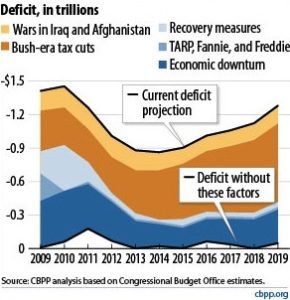

“While the Department is charged with countering serious threats to our security, the Nation faces another, perhaps equally devastating threat. This threat lies not in foreign countries or from unseen enemies, but here at home, where America’s fiscal situation remains unsustainable”, according to House Report 113-091 dealing with DHS Appropriations Bill.
While analyzing a House report dealing with the Department of Homeland Security Appropriations bill I was stunned to read that the department faces threats and priorities other than countering terrorism and protecting the Homeland.
One in particular is the threat posed by America’s deteriorating fiscal situation.
This is an issue many people don’t seem to realize when they talk about the Department of Homeland Security, but it is already adversely impacting the agency and its operations, especially in terms of reduced funding at a time when the threats we face are increasing exponentially.
What follows is an extract from the report detailing this very serious threat to our Nation and its implications if not addressed:
“While the Department is charged with countering serious threats to our security, the Nation faces another, perhaps equally devastating threat. This threat lies not in foreign countries or from unseen enemies, but here at home, where America’s fiscal situation remains unsustainable.
In light of this enormous challenge, the Committee recommends reducing overall spending at DHS by $617,458,000, or 1.56 percent, below the amount provided for fiscal year 2013. This marks the fourth straight fiscal year where discretionary spending for DHS has been reduced from the previous fiscal year’s enacted level. These reductions are made not only to help restore America’s fiscal health, but also to compel the Department to address inefficiencies in a bureaucracy that is among the largest in the Federal government. The importance of the Department’s mission does not make it immune from fiscal discipline.
The Committee rejects any false “tradeoff” between security and spending restraint.
The Committee’s recommendations are intended to force the Department to make wiser investment decisions with limited resources and overhead that will ultimately deliver better capabilities and result in improving the Nation’s security.
The Committee will not tolerate programs that are underperforming or failing to achieve desired outcomes, which is why the bill makes responsible and targeted reductions where taxpayers are not seeing results.
Moreover, the Committee makes recommendations to instill fiscal discipline at DHS over the long term by rejecting poorly justified aspects of the budget request; substantially reducing bureaucratic overhead through no less than a 15 percent reduction in the Department’s Administrative staffing and a 25 percent reduction in administrative expenses and services; decreasing TSA’s Federal staffing level, saving $60 million; and forcing the Department to revisit costly acquisitions to ensure better value to taxpayers.
The bill also compels the Department to more clearly link funding requests to mission requirements and to provide a better accounting of results before seeking additional funding for programs with a questionable or mixed track record. Finally, for the second year in a row, the Committee recommends denying DHS requests to expand its bureaucracy through new standalone offices and instead forces the Department to look at consolidations across a number of overlapping and duplicative programs” (source: House Report 113-091 Department of Homeland Security Appropriations Bill 2014 overview http://thomas.loc.gov).
